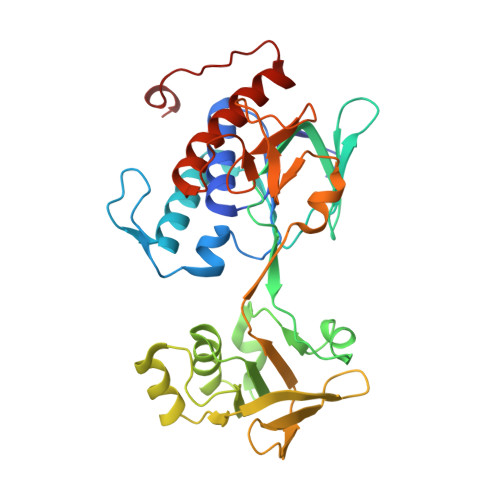The Characterization of Different Flavodoxin Reductase-Flavodoxin (FNR-Fld) Interactions Reveals an Efficient FNR-Fld Redox Pair and Identifies a Novel FNR Subclass.
Gudim, I., Hammerstad, M., Lofstad, M., Hersleth, H.P.(2018) Biochemistry 57: 5427-5436
- PubMed: 30142264
- DOI: https://doi.org/10.1021/acs.biochem.8b00674
- Primary Citation of Related Structures:
6GAQ, 6GAR, 6GAS - PubMed Abstract:
Flavodoxins (Flds) are small, bacterial proteins that transfer electrons to various redox enzymes. Flavodoxins are reduced by ferredoxin/flavodoxin NADP + oxidoreductases (FNRs), but little is known of the FNR-Fld interaction. Here, we compare the interactions of two flavodoxins (Fld1-2), one flavodoxin-like protein (NrdI), and three different thioredoxin reductase (TrxR)-like FNRs (FNR1-3), all from Bacillus cereus. Steady-state kinetics shows that the FNR2-Fld2 electron transfer pair is particularly efficient, and redox potential measurements also indicate that this is the most favorable electron donor/acceptor pair. Furthermore, crystal structures of FNR1 and FNR2 show that the proteins have crystallized in different conformations, a closed and an open conformation, respectively. We suggest that a large-scale conformational rearrangement takes place during the FNR catalytic cycle to allow for the binding and reduction of the Fld and, subsequently, the re-reduction of the FNR by NADPH. Finally, inspection of the residues surrounding the FAD cofactor in the FNR active site shows that a key isoalloxazine ring-stacking residue is different in FNR1 and FNR2, which could explain the large difference in catalytic efficiency between the two FNRs. To date, all of the characterized TrxR-like FNRs have a residue with aromatic character stacking against the FAD isoalloxazine ring, and this has been thought to be a conserved feature of this class of FNRs. FNR1, however, has a valine in this position. Bioinformatic analysis shows that the TrxR-like FNRs can actually be divided into two groups, one group where the FAD-stacking residue has aromatic character and another group where it is valine.
- Department of Biosciences, Section for Biochemistry and Molecular Biology , University of Oslo , Oslo 0316 , Norway.
Organizational Affiliation:


















